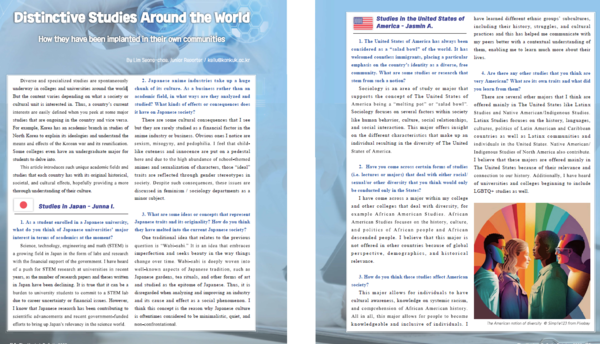How they have been implanted in their own communities.

Diverse and specialized studies are spontaneously underway in colleges and universities around the world. But the content varies depending on what a society or cultural unit is interested in. Thus, a country’s current interests are easily defined when you peek at some major studies that are ongoing in the country and vice versa. For example, Korea has an academic branch in studies of North Korea to explain its ideologies and understand the means and effects of the Korean war and its reunification. Some colleges even have an undergraduate major for students to delve into.
This article introduces such unique academic fields and studies that each country has with its original historical, societal, and cultural effects, hopefully providing a more thorough understanding of their culture.
Studies in Japan – Junna I.
1. As a student enrolled in a Japanese university, what do you think of Japanese universities’ major interest in terms of academics at the moment?
Science, technology, engineering and math (STEM) is a growing field in Japan in the form of labs and research with the financial support of the government. I have heard of a push for STEM research at universities in recent years, as the number of research papers and theses written in Japan have been declining. It is true that it can be a burden to university students to commit to a STEM lab due to career uncertainty or financial issues. However, I know that Japanese research has been contributing to scientific advancements and recent government-funded efforts to bring up Japan’s relevancy in the science world.
2. Japanese anime industries take up a huge chunk of its culture. As a business rather than an academic field, in what ways are they analyzed and studied? What kinds of effects or consequences does it have on Japanese society?
There are some cultural consequences that I see but they are rarely studied as a financial factor in the anime industry or business. Obvious ones I notice are sexism, misogyny, and pedophilia. I feel that child-like cuteness and innocence are put on a pedestal here and due to the high abundance of school-themed animes and sexualization of characters, those “ideal” traits are reflected through gender stereotypes in society. Despite such consequences, these issues are discussed in feminism / sociology departments as a minor subject.
3. What are some ideas or concepts that represent Japanese traits and its originality? How do you think they have melted into the current Japanese society?
One traditional idea that relates to the previous question is “Wabi-sabi.” It is an idea that embraces imperfection and seeks beauty in the way things change over time. Wabi-sabi is deeply woven into well-known aspects of Japanese tradition, such as Japanese gardens, tea rituals, and other forms of art and studied as the epitome of Japanese. Thus, it is disregarded when analyzing and improving an industry and its cause and effect as a social phenomenon. I think this concept is the reason why Japanese culture is oftentimes considered to be minimalistic, quiet, and non-confrontational.
Studies in the United States of America – Jasmin A.
1. The United States of America has always been considered as a “salad bowl” of the world. It has welcomed countless immigrants, placing a particular emphasis on the country’s identity as a diverse, free community. What are some studies or research that stem from such a notion?
Sociology is an area of study or major that supports the concept of The United States of America being a “melting pot” or “salad bowl”. Sociology focuses on several factors within society like human behavior, culture, social relationships, and social interaction. This major offers insight on the different characteristics that make up an individual resulting in the diversity of The United States of America.
2. Have you come across certain forms of studies (i.e. lectures or majors) that deal with either racial/sexual/or other diversity that you think would only be conducted only in the States?
I have come across a major within my college and other colleges that deal with diversity, for example African American Studies. African American Studies focuses on the history, culture, and politics of African people and African descended people. I believe that this major is not offered in other countries because of global perspective, demographics, and historical relevance.
3. How do you think those studies affect American society?
This major allows for individuals to have cultural awareness, knowledge on systemic racism, and comprehension of African American history. All in all, this major allows for people to become knowledgeable and inclusive of individuals. I have learned different ethnic groups’ subcultures, including their history, struggles, and cultural practices and this has helped me communicate with my peers better with a contextual understanding of them, enabling me to learn much more about their lives.
4. Are there any other studies that you think are very American? What are its own traits and what did you learn from them?
There are several other majors that I think are offered mainly in The United States like Latinx Studies and Native American/Indigenous Studies. Latinx Studies focuses on the history, languages, cultures, politics of Latin American and Caribbean countries as well as Latinx communities and individuals in the United States. Native American/Indigenous Studies of North America also contribute. I believe that these majors are offered mainly in The United States because of their relevance and connection to our history. Additionally, I have heard of universities and colleges beginning to include LGBTQ+ studies as well.

